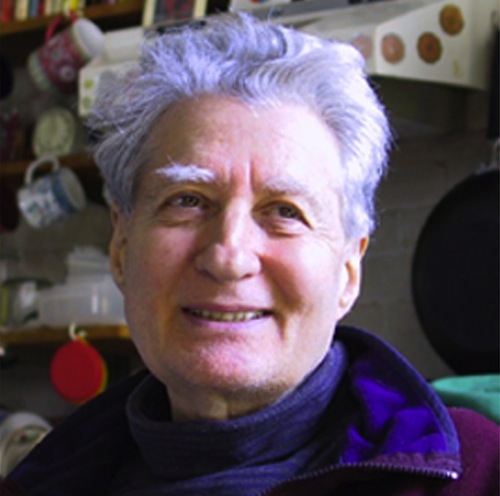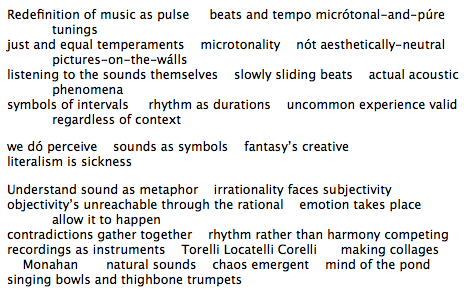
The basic question behind what I think of as root poetics sounds simple: what is language doing—for the poet, for humans at large, for the world—in fact, for itself? What is it doing there on the page/in our eyes or in the air/in our ears? The way we might answer tends to put us on one side or another of familiar issues like identity politics, personal expression, politics in poetry, conceptualization, poetic form or method, etc. Is it possible for a poetic view in our time to be intentionally indeterminate in relation to all these dualisms without seeming evasive or irresponsible?
Let me pretend to be the poet holding that view, although to aspire to such a lofty liminality is no doubt beyond reach. How do we know what language is actually doing? The obvious way is to read and listen—close reading, careful listening, and then writing and further writing. Gertrude Stein reputedly listened, for instance, to the intersection of speech in a room of people talking, a configurative node of potentially unlimited complexity. The result could be considered either “chance” figuration or an unexplainable “expression” of a field of language, allowed to speak for itself. The latter, field expression, is oddly related to a supposed divinatory method practiced in ancient times called kledomancy (divination by keys, for instance dangling a key over a book as a species of bibliomancy), a form of which gave oracular significance to overheard words and phrases (key words/word keys). The former, “chance,” corresponds, for instance, to the work of both Jackson Mac Low and John Cage. In Mac Low’s late masterpiece 154 Forties—fully available now in the beautiful edition edited by Anne Tardos, (Counterpath Press, 2012)—he composed from the field of language wherever he was (at home, out in the city, traveling abroad), drawing words, phrases, even whole sentences from language he read, saw, heard, or thought in the moment of writing. He called it “gathering,” not “chance,” the latter term applying rather to the systematic earlier works like Stanzas for Iris Lezak (Something Else Press, 1971).
The immense range of language textures, moods, rhythms, tonalities, syntactic/trans-syntactic functions, and uncategorizable effects in 154 Forties is unprecedented. Notated as performance text, including stress marks and spacing (explicitly related to Hopkins’ “sprung rhythm”), the sheer density of verbal intricacy can resemble sound text and chance-generated work, as in #42 “Philosophic Diligence” (titles combine one or more words from the beginning and end of the poem):

The music of these lines has the feel of procedural Mac Low, yet even here one senses a directive intelligence in the progress of the poem. In other of the Forties that guiding intelligence is prominent and can give passages an almost genre quality, something like nature poems in sprung rhythm, as in #77 “Boulders Water Leave”:

There are passages which, read a certain way, could almost share the music of a Gary Snyder poem from Mountains and Rivers Without End. And at other times a poem can seem to address its own poetics and alternative music theory, as in the second and third stanzas of #86 “Comfortable Trips”:

What does this tell us about language?
For one thing it tells us that we get different results when we listen or read for something—something we think we want and already know how to hear (poetry!)—than when we allow language to freely talk to us, perhaps through us, or indeed to guide our thinking according to an unknown axis. Mac Low’s work requires an act of reading that is equivalent to the act of writing: a surrender of readerly intention to a radical receptivity. Without such surrender the apparent senselessness of the text will probably just annoy. The text isn’t senseless; it doesn’t of course follow a pre-understood logic, sequencing, style, or narrativity; but it has its own language sense. (In the happy ambiguity of sense we get both sense as meaning and sense as sensory configuration, which can suggest not so much extrasensory as altersensory.) How can we know this? Well, by reading it until it shows itself. A slow process, admittedly, for the uninitiated, but worth the journey. (A comparable challenge is another monument to altersensory reading, Gertrude Stein’s Stanzas in Meditation, in my mind a true predecessor to 154 Forties.)
I first discovered what I call the Mac Low Proof of this intrinsic language sense many years ago when at Station Hill Press we published his powerful work of the “middle period,” Bloomsday (1984), which seemed in certain poems (such as “Entropy Identity Claims”) to be an instance of the chance-generated work that Jackson had long practiced. But it wasn’t. Here’s the second of the fifteen four-line stanzas:
Trench offerings surfeit and flags dolorously mumble
mendicant tricks and vial-glistering trinkets
television trembles toward or voices
flouting hoi polloi in police stations
The main text was spontaneously generated—“written directly,” he writes in the preface, “that is, without use of systematic chance operations.” The richly intricate non-traditional and non-ordinary verbal texture evidently grew out of a language sense cultivated in earlier procedural practice and now integrated with the language “faculty” itself. Procedural control became training wheels for something unknown and emergent. He had lived in the land of a-logical language, had learned the language, a-logically, and now could speak it direct. That this alternative speech could be in active dialogue with the world at large reached its most extensively realized proving ground in the Forties, composed in continual exchange with the world around—sensed qualities, signs, names, foreign words, political issues, upsetting social matters—anything real to him. To read him is to travel in that language land for which no translators or guides avail.
If clichés, dogmas, rules of grammar, and all forms of correctness end up constraining our language sense with the risk of making us docile and susceptible to control by nefarious consensus, then poetry at Mac Low’s level of intensity and free-formation explores a path of mind liberation. It teaches a transformative power of language itself—the alternative to Blake’s “mind forg’d manacles.” How odd that at a time when the State is magnifying the means of control (think NSA, militarized police…) poets can be busy protecting one side or other of constructed dualisms—or are they private fundamentalisms in disguise? Mac Low by contrast was always writing in many ways simultaneously (“contradictions gather together”), as he himself was quick to state—the most “personal” poems (including explicitly intimate and sexual works, like Odes to Iris [1970-71]) side-by-side with the most “impersonal” chance-generated works. Evidently he internalized dualisms without dogmatic poetic constraints and allowed language to find its way amidst the tensions—and releases.
As early as the 1940s Mac Low shared with Robert Duncan a commitment to anarchist principles, and later in attending John Cage’s class at the New School he found a new ally. Their evolving systematic approaches to composition—notably at first the use of the I Ching—showed mutual influence in how they treated both language and sound. Cage stayed with the procedural approach but brought a flexibility and openness of physical voice to performance of text that, to my ears, subtly transformed the very ground of poetics. Jackson went on beyond procedure, as mentioned, to a new order of spontaneous composition, which also performatively changed the physical dimension of poetics. (I for one have never recovered from hearing them: the responsive alteration of ear-mind is unidirectional.) This is hard to explain; one has to listen “deeply” (to use Pauline Oliveros’s term for transformative listening) to the performance voices of both Cage and Mac Low to register the magnitude of the event inside the voice. It can alter our whole sense of the poetic vehicle and what it tells us about language. (Perhaps this is in part what Charles Bernstein meant in Content’s Dream by calling Mac Low “a natural historian of language”; and I would add that this sense of history is that one is history and language the medium of its discovery and evolution.)
Both Cage and Mac Low evolved their view and practice under the influence of Taoist (I Ching) and Zen (D.T. Suzuki) teachings, but neither was willing to be fully represented as Buddhist or religious practitioner except in the sense that the work is performative of altering consciousness—language sense, sound sense. (It would seem in any case that self-identification as Buddhist requires a degree of irony, since the view speaks in terms of “no-self,” “emptiness,” etc.) What is interesting to study, or better, to meditate, is what actually happens to our sense of language when registered in a voice free of pretension, rhetorical effort, poetic elevation, intellectual or conceptual manipulation, or protective enhancement. Voice married instead to language opening to mind. There’s a reciprocity between language and mind that we can feel but hardly understand. It seems to give, for one thing, direct access to the state of mind that is the release and receptivity of the poetic act (as in the Forties or Cage’s Empty Words (Wesleyan, 1979)). Fortunately there are recordings available of both Mac Low and Cage: language history in the process of evolving in your ears.
Questions arise: Is the voice capable of reading out a non- or trans-rational “encoding” of mind in text, or does it perhaps directly embody a state of being? Not just the many ancient claims of a “doctrine of vibrations” but contemporary science too indicates that sound (vibration), including vocal sound, induces significant change in matter in general (as in Cymatics, visible sound waves). That includes body and mind. Morphic resonance, to borrow biologist Rupert Sheldrake’s term for how transformations travel among species. I thought of this recently when, thanks to the John Cage Trust and Laura Kuhn at Bard College, a small group of us sat through uninterrupted recordings of Cage reading the four parts (each two and a half hours) of Empty Words, lasting, with breaks between parts, some twelve hours, ending at dawn, as Cage wanted it performed. It was like an intense meditation retreat, a self-altering state of listening deeper and deeper inside Cage’s voice as it moved from the somewhat recognizable words and phrases of Part One (taken from Thoreau’s sentences on sound and music in the Journals) to the increasingly fragmented, seemingly abstract, but always human sounds of Part Four. It was a psychonautic journey through a singular voicescape erasing personal boundaries, and it opened a language world scarcely reachable in any other way. It left me with an experience of what I’m calling glossodelia (glosso- fr. Greek “language, tongue” and -delic fr. Greek “make manifest, visible” with resonance of “glossolalia” and “psychedelic”)—voicing that reorients the mind, works performing singular initiations into dynamical/lingual events. It’s the sort of event that says something very nearly unsayable about the nature of language and its art forms. Poetic impact on the world may be greater than we think—a high-flying notion, no doubt, but one it seems Cage and Mac Low took seriously.
Poet, writer, musician, and artist George Quasha was born in White Plains, New York, and grew up in ...
Read Full Biography

